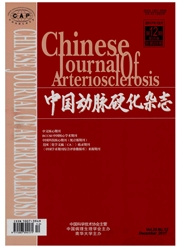

 中文摘要:
中文摘要:
目的探讨佛波酯对血管平滑肌细胞凋亡的影响及可能的作用机制。方法用佛波酯处理体外培养的大鼠动脉平滑肌细胞A10,原位缺口末端标记法检测佛波酯对平滑肌细胞凋亡的影响;用免疫印迹法检测蛋白激酶B及其下游底物的总蛋白和磷酸化水平。结果佛波酯可诱导平滑肌细胞的凋亡。过度表达持续活性的蛋白激酶B明显抑制佛波酯诱导的细胞凋亡;相反,显性负性蛋白激酶B加重佛波酯的促凋亡作用。进一步研究发现,佛波酯可降低蛋白激酶B的磷酸化水平,并随着剂量的增高或时间的延长而逐步降低,同时佛波酯也能抑制蛋白激酶B下游的靶蛋白如叉头转录因子3a和糖原合成酶激酶3β磷酸化水平。最后发现蛋白激酶C抑制剂可阻断佛波酯降低蛋白激酶B磷酸化水平的作用,但丝裂原活化蛋白激酶抑制剂无此作用。结论佛波酯通过蛋白激酶C信号途径抑制蛋白激酶B激酶活性而诱导平滑肌细胞凋亡。
 英文摘要:
英文摘要:
Aim To investigate the effects of 12-O-tetradecanoyl phorbol 13-acetate (TPA} on the apoptosis of vascular smooth muscle cells, and the mechanisms underlying it. Methods The smooth muscle cells ( SMC ) A10 were passed down to logarithmic phase, then were incubated with TPA in different concentrations and at different time points. The apoptotic ceils were detected by TUNEL assay. The protein levels of protein kinase B ( Akt ) and its downstream targets such as Foxos3a, GSK315 were analyzed by Western blot. Results TPA has a marked effect on apoptosis in SMC through inhibition of Akt activation. Moreover, TPA -induced inactivation of Akt was accompanied with the amount of time or dose that SMC was exposed to. Furthermore, protein kinase C ( PKC) signaling pathway was involved in the inactivation of Akt in response to TPA treatment. Conclusions TPA induces apoptosis of SMC through inactivation of Akt, which is mediated by PKC signaling.
 同期刊论文项目
同期刊论文项目
 同项目期刊论文
同项目期刊论文
 Atrogin-1/Muscle atrophy F-box inhibits AKT-dependent cardiac hypertrophy via atypical ubiquitylatio
Atrogin-1/Muscle atrophy F-box inhibits AKT-dependent cardiac hypertrophy via atypical ubiquitylatio Proteasome-dependent inactivation of Akt is essential for 12-O-tetradecanoylphorbol 13-acetate-induc
Proteasome-dependent inactivation of Akt is essential for 12-O-tetradecanoylphorbol 13-acetate-induc CHIP represses myocardin-induced smooth muscle cell differentiation via ubiquitin-mediated proteasom
CHIP represses myocardin-induced smooth muscle cell differentiation via ubiquitin-mediated proteasom 期刊信息
期刊信息
